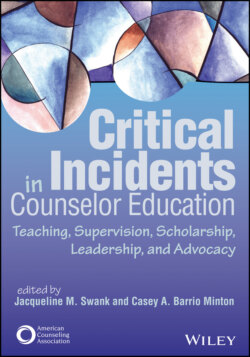Читать книгу Critical Incidents in Counselor Education - Группа авторов - Страница 67
2014 ACA Code of Ethics Standards Addressed
ОглавлениеF.7.c. Infusing Multicultural Issues/Diversity
F.8.c. Self-Growth Experiences
F.11.b. Student Diversity
F.11.c. Multicultural/Diversity Competence
• • •
Professor Malcom was a first-year assistant professor in counselor education at Teachers State University. He identified as a Latinx, cisgender, heterosexual male of middle socioeconomic status. His teaching philosophy was grounded in Socratic questioning. In an attempt to deconstruct power dynamics in the classroom and help students think more deeply about issues, he avoided lecture in favor of guided discussion and asking questions.
Professor Malcom had taught multiple graduate counseling courses during his doctoral studies in a well-respected counselor education program. Despite being warned by his mentors against teaching multicultural courses, Professor Malcom was passionate about the topic and jumped at the opportunity to teach the multicultural counseling course his first year. This was his first time teaching multicultural counseling. Students in the course were relatively ethnically diverse, much to the appreciation of Professor Malcom, who thought that diversity led to richer discussion.
During Week 3 of the course, the class engaged in a discussion regarding how acculturation impacts clients’ worldviews and the counseling process. Anne, who identified as a white woman and later life career changer, expressed a lack of understanding of why minority communities were not able to better assimilate into the United States. She said, “Eastern Europeans and Jews all successfully integrated in the past. Why is assimilation such a problem for communities of color today? I mean, look how successful Jews are.” This statement produced audible moans of disbelief from classmates. Professor Malcom asked Anne to consider whether skin color might play a role in easing the acculturative process for certain ethnic groups. To this, Anne commented that Asians also appeared to be successful in assimilating and succeeding economically. In a calm and inquisitive tone, Professor Malcom asked Anne to consider whether she was buying into stereotypes about Jewish American and Asian American folks. He also asked her to consider whether differences in migrants’ socioeconomic status and U.S. immigration policies might make it easier for certain groups to experience success. Anne did not respond. The remainder of the class was tense, with few students volunteering to participate.
After class, Bell, a student who identified as a queer first-generation college student of African American descent, told Professor Malcom how disappointed she was with class. Bell said she had hoped the course would push her white peers to confront their biases, especially because the course was being taught by a person of color. Furthermore, she told Professor Malcom, “You went too easy on Anne and let her get away with being blatantly racist.” Professor Malcom told Bell that he thought students were on a spectrum of awareness, with some possessing limited knowledge and awareness and others being very knowledgeable and experienced. He told Bell that his approach with Anne was guided by an attempt to meet Anne where she was. He said he hoped his questioning might plant a seed that would lead Anne to think more deeply about her comments and beliefs. Obviously dissatisfied, Bell said good night and left the classroom.
Next week at office hours, Chris, a student who identified as a white male with disabilities, came to speak to Professor Malcom about what had happened in the last class. He told Professor Malcom that he no longer felt safe in class. He said, “I feel like you were rude to Anne, like you did not respect her opinions, which totally goes against the ideals of multiculturalism.” Chris said he was not the only one who no longer felt safe: “I am on a group chat with a few of the white students in class, and none of them feel safe speaking in class after last week.” Professor Malcom asked Chris whether he could differentiate between safety and comfort. He asked Chris specifically whether he feared for his physical and emotional well-being or whether he was uncomfortable with having his ideas questioned. Professor Malcom also asked whether his own identity as a male of color might have been impacting Chris’s perceptions. Chris immediately said he did not think Professor Malcom’s race was an issue, but he had a hard time explaining why he no longer felt safe. He said, “I just feel like you won’t respect my opinions and will attack me if don’t say the right thing.”
Later Bell came to office hours. She told Professor Malcom that she had given thought to their conversation after class last week. She expressed frustration, saying, “I feel like multicultural counseling was designed to educate folks who don’t get diversity. Like this class was not designed for people from oppressed communities and those who have an understanding and appreciation of diversity.” She told Professor Malcom that she got that beginners needed an introduction to diversity and social justice, but she hoped he would do more to facilitate the growth of students who were more advanced. Professor Malcom thanked Bell for sharing her thoughts and said he would do better at meeting the needs of students across the spectrum of multicultural competence.
